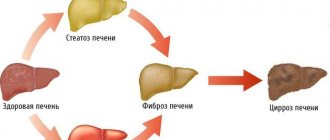The lifestyle of a modern person often leads to the development of many diseases. In particular, low physical activity, poor and irregular nutrition, and an unfavorable environmental environment negatively affect the body, which over time becomes difficult to maintain its normal functioning.
The digestive system, the main part of which is the gastrointestinal tract, is one of the vital human systems. Violation of any of its functions and the development of various pathologies negatively affects a person’s quality of life and leads to many health problems. Gastrointestinal diseases have characteristic symptoms that everyone should know about.
Gastrointestinal tract and causes of its pathologies
Gastrointestinal tract - as one mechanism
The human body is a complex mechanism consisting of many systems that function harmoniously and ensure its viability. The digestive system plays an important role in the life of any organism.
This is due to the fact that a person cannot live without food: with food, he receives everything he needs for normal life - proteins, carbohydrates, fats, various vitamins and other elements.
These particles not only play the role of “fuel”, filling the body with the necessary energy, but are also necessary as a building material that is used to restore and create new cells in all human organs and systems.
The gastrointestinal tract is part of the digestive system, with the help of which the body processes food entering through the mouth and esophagus, and receives from it all the useful and necessary components. The digestive system has several functions, including:
- motor-mechanical function that contributes to the grinding of food and its normal transportation through the intestines for further excretion
- secretory function - with its help, the necessary processing of crushed food particles is carried out using various enzymes, juices, and bile. Secretory function is necessary for the digestion process to proceed correctly and fully.
- absorption function, through which all necessary nutrients and fluids are absorbed
Gastrointestinal diseases are divided into 3 groups
Under the influence of many negative factors, disruptions in the functioning of the gastrointestinal tract often occur, resulting in the emergence and development of diseases in this part of the human digestive system. The development of such pathologies can be provoked by the following reasons:
- poor nutrition. This reason includes: overeating, undereating, irregularity in food intake, excessive speed of its absorption, consumption of monotonous foods. A poorly balanced diet also plays an important role in the process of deteriorating digestion. Among other things, the gastrointestinal tract is negatively affected by harmful additives, dyes and preservatives, which are contained in many products.
- poor environmental condition. The digestive system is adversely affected by low-quality water, pesticides contained in products of plant origin, preservatives and other harmful substances found in products of animal origin.
- congenital predisposition to certain diseases
- side effects of certain medications
- violation of sanitary standards in the process of preparing and consuming food
- poor state of the nervous system: stress, overexertion
- harmful or simply difficult working conditions
- infectious diseases
- parasitic infestations
- endocrine system diseases
- bad habits
Due to the fact that this list of reasons is quite wide, the likelihood of one or another disease of the digestive system occurring is quite high. It is extremely important to pay attention to the state of your health and, if the slightest signs of disturbances in the functioning of the body appear, consult a doctor in a timely manner. This will help reduce the risk of developing serious diseases and their consequences.
Cost of consultation?
| Name of service | Price, rub.) |
| Primary appointment with a general practitioner | 2000 rub. |
| Repeated appointment with a general practitioner | 1500 rub. |
| Initial appointment with a gastroenterologist | 2000 rub. |
| Secondary appointment with a gastroenterologist | 1500 rub. |
| Prescription of treatment (drawing up an individual treatment regimen) | 1500 - 3000 rub. |
All our services and prices
Common stomach diseases
One of the main organs is the stomach
The stomach is one of the main organs that is part of the gastrointestinal tract. So, in it, food is processed by gastric juice, as a result of which the digestion process begins.
Food exposed to gastric juice becomes more liquid. In this state, the crushed food is called chyme. After the stomach, chyme, through the lower sphincter of the organ, enters the following sections of the gastrointestinal tract. In addition to liquefying food, under the influence of digestive enzymes and gastric juice, protein decomposition occurs, so-called hydrolysis.
Also, the acidic environment of the stomach is an excellent barrier to a variety of pathogenic microorganisms. The organ itself is protected from aggressive hydrochloric acid by the mucous membrane. Stomach pathologies are divided into three groups:
- functional
- infectious
- inflammatory
The division is based on differences in the symptoms of different diseases. Each classification manifests itself in its own way, and the signs of diseases differ depending on the course of the disease and the degree of its neglect. The course of stomach diseases can be either acute or chronic.
As a rule, acute forms of organ diseases arise as a result of an infectious disease or poisoning by toxins. The chronic form is the result of the influence of negative factors over a long period of time. Serious stomach diseases, such as cancer, are difficult to treat. Their therapy depends on the timeliness of the patient seeking medical help.
Due to the fact that many gastrointestinal diseases have very similar symptoms, an accurate diagnosis, on which the effectiveness of therapy directly depends, can only be made by a gastroenterologist. Among the diseases that affect the stomach, pathologies such as gastritis are the most common in terms of frequency of occurrence.
This disease manifests itself in the form of an inflammatory process that covers the mucous membrane of the organ. In most cases, gastritis manifests itself in a chronic form. Gastritis often causes the development of other gastric diseases. In case of gastritis, the patient may complain of the following symptoms:
- feeling of heaviness in the stomach
- vomit
- heartburn
- nausea
- belching
- pain in the stomach area
It is important to remember that many gastric pathologies, while occurring in remission, have virtually no signs of manifestation. However, destructive processes continue in the organ even when there are no symptoms.
Gastritis
There are many symptoms of gastrointestinal diseases!
In the case of gastritis, against the background of low acidity of the organ, various formations form on the lining of the stomach - tumors and polyps. Food is not digested sufficiently, the digestion process worsens, and the patient may suffer from anemia.
Diagnostics
Survey. Often, stomach diseases are chronic, develop gradually, and begin with minor symptoms. The patient is subjected to detailed questioning; first of all, the doctor seeks to find out what the patient’s diet is. Thus, the survey allows not only to correctly establish a diagnosis, but also to identify the cause of stomach disease.
Inspection and feeling (palpation). During examination, the doctor may note a protrusion of the epigastric region due to excessive filling of the stomach or significant swelling. The main physical method of examining the stomach is palpation. Percussion and auscultation, as a rule, do not have diagnostic value in this case, due to the fact that the stomach and intestines usually produce the same tympanic sound.
Study of the secretory function of the stomach. In diseases of the stomach, there are cases of changes in its secretory function. There is increased secretion (acidity), normal, decreased, lack of acidity or absolute absence of gastric juice.
X-ray examination. X-ray scanning of the stomach (as well as the intestines and esophagus) with an X-ray machine allows one to obtain a large amount of information. The patient takes a contrast mass (barium salts), it fills the stomach, allowing you to determine its shape and evaluate peristalsis.
Intestinal diseases and their signs
Poor nutrition is the main cause of gastrointestinal diseases
The basis of various intestinal diseases is inflammation, which can be acute, chronic or infectious. During the development of an inflammatory phenomenon, not only one part of the intestine can be affected, but several at once. Depending on the location of the inflammation, the disease has a specific name:
- enteritis
- appendicitis
- sigmoiditis
- proctitis
- colitis
- typhlitis
As a result of inflammation, the mucous membrane of the affected part of the intestine becomes hyperemic, edematous, and discharge of various types may be produced: hemorrhagic, serous or purulent. In especially severe cases, often bleeding ulcers develop. If the development of the ulcer is not stopped, it will eventually cause perforation of the affected area and subsequent development of peritonitis. Intestinal pathologies negatively affect its functions:
- Digestion worsens
- absorption of nutrients stops
- intestinal motility worsens
- there is an increase in mucous secretions
The main signs of pathologies are:
- pain in the abdominal area
- flatulence
- diarrhea
- constipation
- intestinal bleeding
- loss of appetite
Depending on the location of the disease in the intestinal region, it has a specific name. In general, the symptoms of all diseases are similar and the main one is the occurrence of pain.
Esophagitis
Esophagitis
– damage to the mucous membrane of the esophagus, which can cause serious complications such as peptic ulcers, stenosis, Barrett’s disease. The main symptoms of esophagitis are impaired swallowing reflex, heartburn, and chest pain. Diagnosis of the disease includes x-rays of the organ, endoscopic biopsy, and laboratory blood tests. Treatment is prescribed strictly individually, taking into account the etiology of esophagitis and consists of drug therapy and a special diet. In severe cases, surgical intervention is possible.
Colitis
Colitis
– pathological changes in the mucous membrane of the colon due to infectious, toxic, drug damage. The main symptoms are severe pain, diarrhea, constipation, flatulence. To make a correct diagnosis and prescribe medications, stool examinations for the presence of helminths and protozoa, colonoscopy, biopsy, and laboratory blood tests are performed. Treatment is prescribed taking into account the results obtained and includes taking antibacterial drugs, enzymes, probiotics, as well as herbal medicine and dietary nutrition.
Sign up for a consultation
Make an appointment
Where can you get examined, prevented and treated for diseases of the digestive system in Moscow?
In a multidisciplinary medical center you can always undergo examination, prevention and treatment of diseases of the digestive system
. Our medical center is located between the Konkovo and Belyaevo metro stations (South-Western Administrative District of Moscow in the area of the Belyaevo, Konkovo, Teply Stan, Chertanovo, Yasenevo, Sevastopolskaya, New Cheryomushki metro stations " and "Trade Union"). Here you will find highly qualified personnel and the most modern diagnostic equipment. Our clients will be pleasantly surprised by our quite affordable prices.









